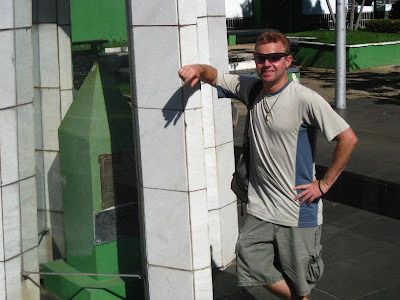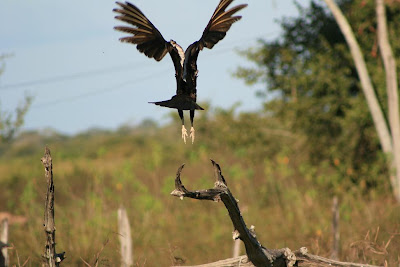Anyway, the Pantanal - my first stop in Brazil after coming over from Bolivia. At the time, coming over from Bolivia to Cuiaba, Brazil seemed quite the exciting adventure. I mean, I spent 20 hours on board of this bus:
 The 'Diplomatico' class bus claimed to have A/C, music, DVD movies, and a bathroom... Oh Bolivia, I sure will miss your quirky sense of humor!
The 'Diplomatico' class bus claimed to have A/C, music, DVD movies, and a bathroom... Oh Bolivia, I sure will miss your quirky sense of humor!During which time we got thoroughly searched three separate times by Bolivian customs officials, wearing funny caps that said FELON... oh, wait, it's actually FCLON. Close enough to amuse me... But then I got to spend a week in a variety of boats on the Amazon, and the cold and bumpy Bolivian bus ride suddenly started to seem like a downright attractive alternative.
The Pantanal is an area in the South West of Brazil, which is home to an amazing variety of wildlife. There are three cities scattered around it, which serve as primary access points to the Pantanal: Campo Grande, Cuiaba, and Corumba. I headed to the Cuiaba, the northernmost of the three, which was difficult to reach from Santa Cruz, but since I wanted to head up North to the Amazon afterwards, seemed like the right place to go. Unfortunately, not a lot of tourists seem to come to Cuiaba, so the tour agencies grow a little desperate in their hunt for tourists - at one point, I had accompanied Joel, who would eventually be our tour organizer, to the airport, where he was quite openly hunting for new-arriving tourists, hoping to sell them on a tour... Nice guy otherwise though. At my hostel, I met Sander (a Dutch guy, who happened to be the only other traveler staying at the hostel at the time) - we declined our hostel owner's overtures to go on a tour with him, and eventually settled on a three day tour with afore-mentioned Joel. So, before heading out into the wilderness, a couple of sights of Cuiaba (really, this was all there was to see in Cuiaba):
 A sizeable Cathedral
A sizeable Cathedral And a monument marking the geographical center of South America.
And a monument marking the geographical center of South America.And with that, we headed off to the Pantanal. Now, as you may have heard, June is the high water season in the Amazon. The Pantanal, some 1,000 miles away seemingly has the reverse weather patterns, so June is the low water season here. Not to say that there isn't plenty of water:
 The river and the forests of Pantanal
The river and the forests of Pantanal Unlike the Amazon, boats are a convinience here, not the sole means of transport
Unlike the Amazon, boats are a convinience here, not the sole means of transport Here, you can also get around by horse!
Here, you can also get around by horse! lurking in the waters
lurking in the waters sunset over the Pantanal
sunset over the PantanalThe strange thing about the Pantanal is that in spite of how unique the environment is, and in spite of all the fauna that lives there (some of it endagered), almost none of the land in the Pantanal is protected. We stayed 3 nights - spending time at two different farms, which both seem to have transitioned smoothly from catering to cattle to catering to tourists.
The primary occupants of the land are birds. I equipped myself with a fancy new 300mm lens for my camera back in Santa Cruz, so I could suddenly get a lot more zoom and get all these shots of the birds:
 A big (and loud) blue parrot
A big (and loud) blue parrot A not so big green parrot
A not so big green parrot Tucans, with their huge orange beaks, are pretty elusive, so I had to track him for a while just to get this shot
Tucans, with their huge orange beaks, are pretty elusive, so I had to track him for a while just to get this shot a pair of birds hanging out near the river, not paying much attention to the humans scurrying below
a pair of birds hanging out near the river, not paying much attention to the humans scurrying below Teamwork means one guy gets close to the bird, getting him to fly, while the other gets a good shot right as the bird is taking off. I rather like the new lens
Teamwork means one guy gets close to the bird, getting him to fly, while the other gets a good shot right as the bird is taking off. I rather like the new lens An ibis in flight
An ibis in flight and a stork
and a storkSo, that was the birds. After three days, I gamely concluded that bird watching really isn't for me - just because a bird is rare doesn't mean I actually care about seeing it. Give me something interesting and picturesque, and I'll snap a few photos of it, but I just fail to see the joy of sitting in place for hours on end just hoping to spot some tiny little critter that you hadn't seen before... None of the birds in the shots above are in any way rare.
The other major presence in the Pantanal are the caymans. These guys are from the crocodile family, but don't grow to be quite as big as the huge gators in Florida or crocs in Australia. Still, make for a somewhat intimidating sight, what with all those teeth staring at the sun:
 Go new zoom lens, go!
Go new zoom lens, go! Nobody wanted to go swimming, even though the caymans were all busy trying to avoid us
Nobody wanted to go swimming, even though the caymans were all busy trying to avoid us And here's how you catch a cayman by the tail - come up behind him where he can't see you, and make sure you are not in the direct line of sight of another one. At this point, the cayman itself really doesn't seem to care very much. If you start making any noise though, he'll sneak back into the water. Besides, these guys are small enough that I felt I could take one!
And here's how you catch a cayman by the tail - come up behind him where he can't see you, and make sure you are not in the direct line of sight of another one. At this point, the cayman itself really doesn't seem to care very much. If you start making any noise though, he'll sneak back into the water. Besides, these guys are small enough that I felt I could take one!The first farm where we stayed, there were just a few of these guys swimming around in the river. Moving to the second farm, we had suddenly arrived in cayman country - there had to be a few dozen of them just sunning themselves right on the road leading to the pousada. As they live in or near the water, the low water season tends to concentrate the caymans in the spots with more water, so you get bigger bunches of them than you would during the high water season.
 The birds were out in force as the sun was starting to set
The birds were out in force as the sun was starting to setAfter the sun had set, we set off on a night safari on one of the nights, but, sadly, still no pumas and anacondas, just a few oversized, Amazonian rodents. The sunrise excursion that same morning (it ended up being a looong day) was a little more productive as we got to watch the sun slowly burning through the myst over the forest early in the morning.
And after three days of watching various birds and animals, we promptly headed back to Cuiaba for another night at my extremely empty hostel, as I set off trying to figure out how in the world I was going to get to the Amazon.
No comments:
Post a Comment